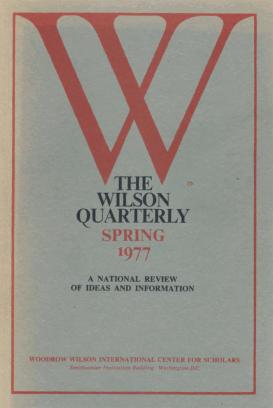TV News and Politics


"disease agencies" (e.g., the Heart Fund) have fostered a "national obsession" with disease. In turn, "unsupportable demands" have arisen for illusory preventive medicine; seeing the doctor has become a "cultural habit." Redesigned for use only when really needed, Thomas contends, the health system would probably cost much less; new investment should be for research to move future health technology beyond the "halfway" point.
RESOURCES & ENV...
by Charles A. Coombs
Wiley, 1976, 243 pp. $12.95
L of C 76-19093
by John F. Devlin
Hoover, 1976, 372 pp. $11.95
L of C 75-41903
by Robert B. Edgerton
Univ. of Calif., 1971
351 pp. $14.50
L of C 73-117948
by Harry V. Jaffa
Univ. of Wash., 1973
451 pp. $4.95 (paper only)
L of C 59-10671
by Harold G. Vatter
Greenwood, 1975, 368 pp. $15
L of C 75-16970
by Bogdan Denis Denitch
Yale, 1976, 254 pp. $15
L of C 75-18170
by Richard Sennett
Knopf, 1977,389 pp. $15
L of C 76-25131
by B. L. Reid
Yale, 1976, 532 pp. $25
L of C 75-18184
edited by John L. Stanley
Oxford, 1976,388 pp. $15
L of C 75-16902
by Robert W. Tolf
Hoover, 1976, 269 pp. $14.95
L of C 76-284
by Charles Coleman Sellers
Wesleyan, 1976,281 pp. $14.95
L of C 76-7193
by Walter Laqueur
Little, Brown, 1976
462 pp. $17.50
L of C 76-22552
by C. Martin Wilbur
Columbia, 1976, 413 pp.
$16.50
L of C 76-18200
edited by Edward Bacon
Bobbs-Merrill, 1976, 428 pp.
$35
L of C 76-10081
edited by
Stanley W. Lindberg
Van Nostrand Reinhold,
1976, 358 pp. $12.95
L of C 76-9845
1971: A Documentary Record
655 pp. $24.50
L of C 75-13518
by Joseph A. Pechman
Brookings, 1977,401 pp.
$11.95 cloth, $4.95 paper
L of C 76-54901
by Leonard Silk and
David Vogel
Simon & Schuster, 1976
251 pp. $8.95
L of C 76-14461
by Mahbub Ul Haq
Columbia, 1976, 247 pp.
$12.50 cloth, $5.95 paper
L of C 76-7470
edited by Nancy J. Hafkin
and Edna G. Bay
Stanford, 1976,306 pp. $15
L of C 75-44901
by David Douglas Duncan
Norton 1976, 113 pp. $12.50
L of C 76-5571
by Andres Segovia
Macmillan, 1976,207 pp.
$10.95
L of c 76-42291
by Murasaki Shikibu
Knopf, 1976, 1,090 pp. vol.
$25
L of C 76-13680
by Pablo Neruda
Farrar, Straus & Giroux
1977, 370 pp. $11.95
L of C 76-27329
by Frank Tuohy
Macmillan, 1976,232 pp.
$17.95
L of C 76-12608
By James
A. Field. Princeton reprint, 1976. 485
pp. $5.95 (cloth, $16)
Edited by A. Law-
rence Chickering. Institute for Con-
temporary Studies, 1976. 248 pp. $3.95
By Charles H. Shattuck.
Folger Books, 1976. 170 pp. $7.95
(cloth, $19.95)
By James
A. Nathan and James K. Oliver. Lit-
tle, Brown, 1976. 598 pp. $10.95 (paper
only)
By Henry F. Dobyns. Univ. of
Ind., 1976. 99 pp. $3.95 (paper only)
By Bernard Lewis. Princeton
reprint, 1976. Ill pp. $2.95 (cloth,
$7.95)
Edited by Joanna Bankier et al. Nor-
ton, 1976. 218 pp. $3.95 (cloth, $10)
the rioting black youths of Soweto outside Johannesburg. The Re- public's future as a locus of Western investment, a friendly mili- tary power, and prosperous citadel of white supremacy is again a matter of scholarly speculation and much debate. Our Back- ground Books cover the entire area of Southern Africa. Our essayists focus on South Africa. Historian Lewis H. Gann ex-amines the peculiar white experience which has so strongly shaped Pretoria's politics. Political scientist Gwendolen Carter reviews...
Thomas E. Patterson
The 1976 presidential campaign, as presented on the network evening news, was primarily a competition to be won or lost. Only secondarily did it seem to involve national policy and quality of leadership.
Most of the evening news coverage was given over to what can most aptly be called the "horserace"-the candidates' comings and goings on the campaign trail, their strategies for winning votes, and their prospects for victory or defeat. Such subjects accounted for 60...
1928, despite a prominent Republican's re-mark that "We haven't time to monkey around with novelties," Democrats and Republicans were ready to spend a total of more than $1 million for commercial radio time. But not until the mid-1940s did the first detailed examination of ra- dio's impact on politics appear-in THE PEOPLE'S CHOICE: How the Voter Makes Up His Mind in a Presidential Campaign Paul F.Lazarsfeld et al. (Columbia, 1944, later eds. 1948-68, cloth & paper).
The case in point...
Most of us have grown up with the idea that large states have more influence in the selection of a President than small states because of the peculiarities of our electoral system. The big states do wield significant power on Election Day because of the all-or- nothing quality of the electoral college vote. But there is, in fact, an even greater inequality of influence among the states during the nominating process-the state conventions, caucuses, and pri- mary elections. This particular inequality c...
As always when a new administration settles in, there is specula- tion in Washington over the Supreme Court-its future direction, possible vacancies, presidential appointees. The nine Justices often surprise Presidents. As the makeup and outlook of the Court change, the Justices do not always decide constitutional cases along predictable ideological lines. The Court's decisions have shaped America's history; in no other nation is the highest court so powerful. Here, political scientist Alpheus...
By the late 1960s, many educated Americans (novelist Updike has observed) had come to focus not on books but on "the art mu-seum, the symphony orchestra, the cinema, the educational TV band, the charming conversation-these were where the essences of culture condensed and could be supped." Today, to an extent not possible before World War 11, "a person who takes pride in being civilized may feel, at heart, that the written word, in its less casual forms, has nothing crucial to offer." M...